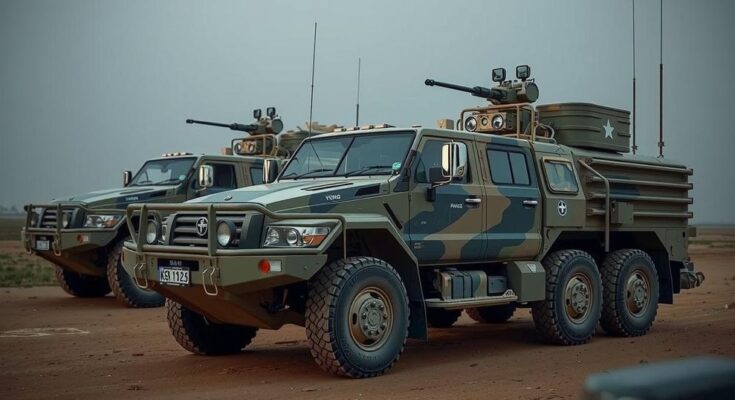Amnesty International has reported that French military technology on UAE-manufactured APCs in Sudan likely violates the UN arms embargo on Darfur. The organization calls for the French government to stop such arms supplies and urges international compliance with the embargo to prevent further human rights abuses.
In a recent investigation, Amnesty International has revealed that French military technology is being used in armored personnel carriers (APCs) in Sudan, potentially constituting a violation of the United Nations arms embargo on Darfur. Specifically, the study identifies APCs manufactured by the United Arab Emirates (UAE) that are equipped with French-designed reactive defense systems, being operated by the Rapid Support Forces (RSF) in conflict zones throughout Sudan. The APCs in question are the Nimr Ajban models produced by Edge Group in the UAE and outfitted with the Galix system, developed by Lacroix Defence in collaboration with Nexter from France. Verified images illustrate the presence of the Galix system on captured or destroyed Nimr Ajban APCs, which is described as a mechanism that can release decoys and smoke to defend against close-range threats. Agnès Callamard, Amnesty International’s Secretary General, emphasized that the situation reflects a significant arms flow into Sudan that exacerbates civilian suffering and necessitates immediate action to enforce the arms embargo. The organization has urged the French government to cease supplying arms to the UAE and ensure compliance with international laws prohibiting the export of weaponry that may contribute to human rights violations. Amnesty International has reasoned that the longstanding defense collaboration between France and the UAE may play a role in the observed violations, with French companies reportedly supplying military equipment valued at approximately EUR €2.6 billion to the UAE from 2014 to 2023. Since 1994, the European Union has enforced an arms embargo on Sudan that prohibits the sale or delivery of military equipment, which complicates the legal landscape surrounding arms exports. Moreover, the organization has advocated for an expansion of the UN arms embargo to encompass all of Sudan and highlights the necessity for stronger enforcement measures. Given the UAE’s past breaches of UN arms sanctions, Amnesty has called upon all involved corporate entities to engage in thorough human rights due diligence to prevent complicity in potential abuses. In summary, Amnesty International’s findings point to a severe breach of the UN arms embargo in Sudan due to the use of French military technology in UAE manufactured APCs. It emphasizes the urgent need for international compliance with arms control measures to protect vulnerable populations in conflict-affected regions, and the prevention of further deterioration of humanitarian conditions.
Amnesty International’s investigation arises from ongoing concerns regarding violations of the UN arms embargo on Sudan, particularly in the context of human rights abuses stemming from the conflict in Darfur. The use of sophisticated military technology, specifically that which is sourced from French manufacturers, raises critical legal and ethical questions about arms exports to regions involved in armed conflict. With a prolonged history of military cooperation between France and the UAE, the implications of these arms supplies extend beyond mere commerce to the potential exacerbation of conflict and civilian suffering.
In conclusion, the participation of French military technology in APCs operated by Sudan’s RSF raises serious implications under international arms embargo regulations. Amnesty International urges proactive measures from the French government and the international community to halt arms supplies that facilitate human rights violations. Ensuring that arms export controls are stringent and effectively implemented is essential to safeguarding civilian lives amidst ongoing conflicts in Sudan.
Original Source: www.dabangasudan.org




